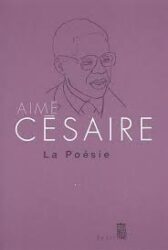#Suzanne Césaire
Explore tagged Tumblr posts
Text


Suzanne Césaire (1915–1966) was a Martinican writer, teacher, and intellectual known for her contributions to the Negritude and Surrealist movements. Born in Trois-Îlets, Martinique, she married poet and politician Aimé Césaire and collaborated with him on significant cultural and political initiatives. Suzanne co-founded the influential journal Tropiques (1941–1945), where she wrote essays exploring Caribbean identity, surrealism, colonialism, and cultural liberation. Her writings celebrated Martinique's unique culture while critiquing European colonial frameworks.
Suzanne Césaire passed away in 1966 at the age of 50, leaving behind a legacy of intellectual resistance and cultural advocacy that has continued to inspire thinkers and writers in postcolonial studies. Despite her relatively small body of published work, her ideas have had a profound and enduring impact. 🇲🇶
#black people#black history#black#blacktumblr#black tumblr#pan africanism#black conscious#africa#black power#black empowering#Suzanne Césaire#martinique#negritude#black revolutionaries
36 notes
·
View notes
Text


Voice of the Oracle: Surrealist Game, April 1942
Aimé Césaire, Suzanne Césaire et al.
Do you want to hear the great voice of the oracle? The explosive voice of life?
Sit down around a table. Take a sheet of paper and boldly write down what it is you want to know. Fold the paper, pass it to your neighbor who will write an answer without reading your question. And so on.
Open the paper and read. You will hear echoes that come from very far away, farther than yourself; and you will finally have the most beautiful conversation you have ever had with anyone and with yourself.
Take a look.
from Black, Brown, & Beige Surrealist Writings from Africa and the Diaspora (eds. Franklin Rosemont and Robin D. G. Kelley)
#Aimé Césaire#Suzanne Césaire#surrealist writings from africa and the diaspora#oracles#echoes#conversations
0 notes
Text
Now it is a question of seizing and admiring a new art which leaves humankind in its true condition, fragile and dependent, and which nevertheless, in the very spectacle of things ignored or silenced, opens unsuspected possibilities to the artist.
– Suzanne Césaire (1941)
0 notes
Text

new-to-me #842 - The Ballad of Suzanne Césaire
#2024 in Films#The Ballad of Suzanne Césaire#Madeleine Hunt Ehrlich#52 films by women#directed by women#Chi Film Fest
11 notes
·
View notes
Text

Suzanne Césaire, Discontent of a Civilization
9 notes
·
View notes
Text
youtube
cried the entire runtime of the ballad of suzanne césaire and have convinced myself this charli song is about the colonial wound
4 notes
·
View notes
Text

Suzanne Césaire, "1943 : Le Surréalisme et nous"
0 notes
Text
Madeleine Hunt-Ehrlich Among 2025 Talents Participants
Visual artist and The Ballad of Suzanne Césaire filmmaker Madeleine Hunt-Ehrlich is among the names that have been set for the Talents programme at this year’s Berlin Film Festival. The Talents lineup was announced by the festival this morning alongside eight premiere titles added to its Berlinale Classics lineup and the ten books heading for the festival’s adaptations Co-Production…
0 notes
Text
0 notes
Text
“Le Grand Camouflage” (“The Great Camouflage”) By Suzanne Césaire
Crammed against the islands are the beautiful green blades of water and silence. Around the Caribbean Sea is the purity of salt. Down there in front of me is the pretty square of Pétionville, planted with pine and hibiscus. My island, Martinique, is there, with its fresh garland of clouds prompted by Mount Pelée. There are the highest plateaux of Haiti, where a horse is dying, struck by lightning in the age-old murderous storm of Hinche. Nearby, his master contemplates the land he used to believe was solid and generous. He does not yet realize that he is participating in the islands’ absence of equilibrium. But this outburst of terrestrial insanity illuminates his heart: he starts thinking about the other Caribbean islands, with their volcanoes, their earthquakes and their hurricanes.
At that moment a powerful cyclone starts to swirl in the open seas off Puerto Rico in the midst of billows of clouds, its beautiful tail sweeping the length of the Caribbean semicircle. The Atlantic flees towards Europe in great ocean waves. Our little tropical observation posts start to crackle out the news. The wireless is going mad. Ships flee — where can they go? The sea swells, this way, that way, with an effort, a luscious leap, the water stretches out its limbs as it gains greater awareness of its watery strength; sailors clench their teeth and their faces are streaming wet, and it is reported that the cyclone is passing over the south-east coast of the Haitian Republic at a speed of thirty-five miles per hour as it heads for Florida. Those objects and beings still just out of reach of the wind are gripped with apprehension. Don’t move. Let it pass by…
In the eye of the cyclone everything is snapping, everything is collapsing with the rending sound of tumultuous events. The radios fall silent. The great palm-tree tail of fresh wind is unfolding somewhere in the stratosphere where no one will follow its wild iridescence and waves of purple light.
After the rain, sunshine.
The Haitian cicadas consider chirping out their love. When not a drop of water remains on the scorched grass, they sing furiously about the beauty of life and explode into a cry too vibrant for an insect’s body. Their thin shell of dried silk stretched to the limit, they die as they let out the world’s least moistened cry of pleasure.
Haiti remains, shrouded in the ashes of a gentle sun with eyes of cicadas, shells of mabouyas, and the metallic face of a sea that is no longer of water but of mercury.
Now is the moment to lean out of the window of the aluminum clipper on its wide curves.
Once again the sea of clouds appears, which is no longer intact since the planes of Pan American Airways pass through. If there is a harvest in process of ripening, now is the time to try to glimpse it, but in forbidden military zones the windows remain closed.
Disinfectant or ozone is brought out, but it hardly matters, you’ll see nothing. Nothing but the sea and the confused lay of the land. You can only guess at the uncomplicated loves of the fishes. They stir the waters, which give a friendly wink to the clipper’s windows. Seen from high above, our islands assume their true dimensions as seashells. The hummingbird-women, the tropical flower-women, the women of four races and dozens of blood ties, have gone. So too have the canna, the plumeria and the flame tree, the moonlit palm trees, and sunsets seen nowhere else on earth…
Nevertheless they’re there.
Yet it was fifteen years ago that the Caribbean was disclosed to me from the eastern slope of Mount Pelée. From there I realized, as a very young girl, that, as it lay in the Caribbean Sea, Martinique was sensual, coiled, spread out and relaxed, and I thought of the other islands, equally beautiful.
I experienced the presence of the Caribbean once more in Haiti, on summer mornings in 1944, which was so much more perceptible in the places from which, at Kenscoff, the view over the mountains is of an unbearable beauty.
And now complete lucidity. My gaze, going beyond these perfect forms and colors, catches by surprise the torment within the Caribbean’s most beautiful face.
Because the thread of unsatisfied desires has caught the Caribbean and America in its trap. Since the Conquistadors arrived and their technology (starting with firearms) developed, not only have the transatlantic lands had their appearance changed, they have learned new fears. Fear of being outdistanced by those who remained in Europe, already armed and equipped; fear of being confused with the colored peoples who were immediately declared inferior in order to make it easier to bully them. It was necessary initially and at any price — be it the price of the infamy of the slave trade — to create an American society richer, more powerful and better organized than the forsaken but desired European society. It was necessary to take revenge on the nostalgic hell which vomited its adventurous demons, its convicts, its penitents and its utopians over the New World and its isles. The colonial adventure has continued for three centuries — the wars of independence being only one episode — and the American peoples, whose attitude towards Europe often remains childish and romantic, are not yet freed from the old continent’s grip. Naturally it is the American Blacks who suffer most from the daily humiliations, degeneracies, injustices, and shabbiness of colonial society.
If we are proud to proclaim our extraordinary vitality throughout the Americas, if it seems to promise us a definitive salvation, we need the courage to say that subtle forms of slavery remain rampant. Here, in these French islands, it still debases thousands of negroes, for whom a century ago the great Schoelcher demanded, in addition to liberty and dignity, the title of citizens. We must dare to point out, caught by the implacable spotlight of events, the Caribbean stain on France’s face, since so many of the French seem determined to tolerate no shadow of it.
The degrading forms of modern wage labor still find a plot of land upon which to flourish unchecked among us.
Who will cast out, along with obsolete factory machinery, the thousands of sub-industrialists and grocers, that caste of false colonists responsible for the human decline of the Caribbean?
As they drift along the streets of the capitals among their European brothers, an insurmountable timidity fills them with fear. Ashamed of their languid accent and rough French, they sigh for the calm warmth of their Caribbean homes and the patois of the Black da1 of their childhood.
Prepared for any form of betrayal in order to defend themselves against the mounting tide of Blacks, they would sell themselves to America (if the Americans didn’t claim that the purity of their blood is more than suspect) just as, in the forties, they proclaimed allegiance to the Vichy admiral: Pétain being the altar of France for them, Robert2 had to become the “tabernacle of the Caribbean.”
Meanwhile, the Caribbean serf lives miserably and abjectly on the “factory” lands, and the mediocrity of our market towns is a sickening sight. Meanwhile, the Caribbean is still a paradise with the gentle sound of palm trees…
That day the irony was that, a garment gleaming with sparks, each of our muscles expressed in its own way part of the desire scattered over the blossoming mango trees.
I listened very attentively to your voices lost in the Caribbean symphony which launched downpours to assault the isles, but could not hear them. We were like thoroughbreds, held in check but chafing at the bit, on the edges of this salt savanna.
On the beach were several “metropolitan officials.” They stood there uneasy, ready to flee at the first signal. Newcomers have difficulty adapting to our “old French lands.” When they lean over the baleful mirror of the Caribbean Sea, they see their own delirious image. They don’t dare recognize themselves in that ambiguous being, the West Indian. They know the métis has some of their blood; that they both belong to Western civilization. Of course, “metropolitans” are unaware of color prejudice. But their colored descent fills them with fear, in spite of the exchange of smiles. They didn’t expect this strange burgeoning of their blood. Perhaps they would prefer not to respond to their Caribbean heirs who simultaneously cry out and do not cry out, “Father.” Yet they have to reckon with these unexpected sons and charming daughters. They have to govern this turbulent people.
Here’s a West Indian, the great-grandson of a colonist and a Black slave woman. Here he is in his island, ensuring its “smooth running” by his deployment of all the energies once needed by avaricious colonists for whom the blood of others was the natural price of gold and all that courage needed by African warriors in their perpetual struggle to wrest life from death.
Here he is with his double strength and double ferocity, in a dangerously precarious equilibrium: he cannot accept his negritude, but nor can he make himself white. Listlessness overcomes this divided heart, and with it come habits of trickery, a fondness for “fiddles”; this is how that flower of human servility the colored bourgeoisie blooms in the Caribbean.
Along roads bordered with gliricidia pretty Black children, relishing the cooked roots — salted or unsalted — that they eat, smile at the posh car as it passes. They suddenly feel, in the pits of their stomachs, the need one day to be masters of a beast so supple and shiny and powerful. Years later, stained with the fat of comfort, they can be seen miraculously giving a quivering of life to rejected carcasses, in order to sell them for a song. The hands of thousands of young West Indians have instinctively weighed up the steel, considered the joints and loosened the screws. Thousands of images of gleaming factories, unwrought steel and liberating machines have swelled the hearts of our young workers. In hundreds of sordid sheds where scrap iron rusts, there is an invisible vegetation of desires. The impatient fruits of the Revolution will inevitably gush forth from it.
Here among the mornes smoothed by the wind is the Free-Men’s Estate. A peasant, in whom the mechanical adventure still inspires no excitement, leans against a giant mapou which shades the whole side of the morne, feeling a dull thrust of vegetation welling up through him from his bare toes as they sink into the mud. Turning towards the setting sun to see what the weather will be like tomorrow — the orangish red indicates that planting time is near at hand — and his gaze is not only the gentle reflection of the light, but becomes oppressive with impatience, the very one which stirs the Martiniquan earth — this earth which does not belong to him yet is his earth. He knows that it is in league with them, the workers, and not with the béké or the mulatto. And when suddenly, in the Caribbean night decked out with love and silence, the drum roll explodes, the Blacks get ready to respond to the desire of the earth and of dance, but the landowners, immured in their beautiful mansions behind their wire gauze, appear like pale butterflies caught in a trap under the electric light.
All around them the tropical night swells with rhythm, Bergilde’s hips have assumed, in the oscillations that surge from the chasms on volcano flanks, their appearance of cataclysm and it is Africa itself which, beyond the Atlantic and the centuries before the slave traders, dedicates the look of solar lust exchanged by the dancers on its West Indian children. Their cries proclaim, in a raucous and generous voice, that Africa is here, present; that it is waiting, immensely chaste despite the stormy, devouring colonization by the whites. And across these faces constantly bathed in the effluvium of the sea around the islands, across these bounded and small lands surrounded with water like huge impassable gulfs, passes the remarkable wind that has come from a continent. The Caribbean-Africa, thanks to the drums and the nostalgia for terrestrial places, lives on in the hearts of these island peoples. Who will satisfy their nostalgia?
Yet Absalom’s canna bleeds on the chasms and the beauty of the tropical landscape goes to the heads of passing poets. Through the shifting tracery of the palms, they see the West Indian blaze swirling over the Caribbean Sea which is a calm sea of lava. Here life is kindled by a vegetal fire. Here, on the warm earth that keeps alive geological species, the plant, through passion and blood, through its primitive architecture, establishes disquieting chimes surging from the dancers’ chaotic loins. Here the liana, vertiginously balanced, assumes aerial poses to charm the precipices, hooking trembling hands to the ungraspable cosmic trepidation that mounts right through nights inhabited with drums. Here poets feel their heads reeling and, imbibing the fresh odors of the ravines, they seize the spray of the islands, listen to the sound the water makes around them, and see the tropical flames no longer revive the canna, the gerbera, the hibiscus, the bougainvillea and the flame trees, but instead the hungers, the fears, the hatreds, and the ferocity that burns in the hollows of the mornes.3
And so the conflagration of the Caribbean Sea heaves its silent vapors, blinding for the only eyes able to see and suddenly the blues of the Haitian mornes and the Martiniquan bays fade, the most dazzling reds pale, and the sun is no longer a crystal that plays, and if the market squares have chosen the tracery of Jerusalem thorns as luxury fans to ward off the sky’s ardor, if the flowers have known how to find just the right colors to make you fall in love, if the arborescent ferns have secreted golden essences for their croziers, coiled up like a sex, if my West Indies are so beautiful, it shows that the great game of hide and seek has succeeded and certainly that day would be too lovely for us to see it.
Suzanne Césaire, “The Great Camouflage,” originally published in Tropiques nos. 13-14 in 1945. This edition was published in Refusal of the Shadow: Surrealism and the Caribbean, edited by Michael Richardson and translated by Krzysztof Fijalkowski and Michael Richardson. Verso 1996.
0 notes
Text
Cinema Guild Acquires 'The Ballad of Suzanne Césaire' in North America
Cinema Guild, the New York-based distributor of world cinema, has acquired the North American distribution rights for The Ballad of Suzanne Césaire, the first feature by artist and writer-director Madeleine Hunt-Ehrlich. The film is described as “a post-biopic about Caribbean surrealist Suzanne Césaire, deconstructing the process of bringing an actually-lived life to film. The film examines her…

View On WordPress
0 notes
Text
Aimer Aimé - Jean-Marie Audrain

Un

œil sur la poétique L’autre sur la politique; Il aurait aimé n’user Que du premier, notre Aimé.

Il narrait sa négritude Du fond de sa solitude. Etudier à Fort de France Lui donna toutes ses chances.

Sa muse s’appelait Suzanne De la même île des bananes. Son œuvre vint d’un cahier Edité par "Volontés". Chaque ligne fut un retour

Vers son pays des amours. Violent autant que lyrique Miroir de sa Martinique.

Un romantique tel Rimbaud Ses vers menaient vers le haut; Une éloquence à l’envi Sonnait comme du Péguy.

Maître des mots et des jeux Dans un style méticuleux, On devinait qu’il lisait Les oraisons de Bossuet.

Resplendissant tel Claudel Son style voguait sur deux ailes Nuées côtoyant sans gène L’argot des rues parisiennes.

Un jour, Breton le lisant Déclara que, mieux qu’un blanc Ce noir était plus à l’aise Pour manier la langue française.

Césaire désira choisir L’épitaphe du souvenir Et sur sa tombe sont gravés Ces mots pour l’éternité :

« La pression atmosphérique ou plutôt l'historique Agrandit démesurément mes maux Même si elle rend somptueux certains de mes mots. » Read the full article
#aimé#argot#Bossuet#Breton#Césaire#Épitaphe#FortdeFrance#jean-marieaudrain#Jeanmarime#Martinique#metro#paris#politique#racisme#Rimbaud
1 note
·
View note
Text
"While [Frantz] Fanon argued in Wretched of the Earth that violence is the first act of decolonial melodrama, the activator, Mondlane argued that culture loads the gun, and armed struggle pulls the trigger. Revolution is, directly translated, about returns. Culture— blues, poetry, storytelling, offers, as Suzanne Césaire wrote, a return to ourselves. The pendulum swings away from liberation, and we must swing it back."
The Pendulum Swing Of Black Liberation - PopularResistance.Org
https://popularresistance.org/the-pendulum-swing-of-black-liberation/
"I’m referring to another mode of conceptualizing this persistent pendulum swing between rebellion and state repression. A lived dialectics, yes, but also exceeding the framework of dialectics, which tells us that social movements are the antagonizing force pushing against larger structures. Our most durable movements are always dynamic; they oppose systems while also evading systems-thinking altogether."
2 notes
·
View notes
Text
Thus, far from contradicting, diluting, or diverting our revolutionary attitude toward life, surrealism strengthens it. It nourishes an impatient strength within us, endlessly reinforcing the massive army of refusals.
And I am also thinking of tomorrow.
Millions of black hands will fling their terror across the furious skies of world war. Freed from a long benumbing slumber, the most disinherited of all peoples will rise up from plains of ashes.
Our surrealism will supply this rising people with a punch from its very depths. Our surrealism will enable us to finally transcend the sordid dichotomies of the present: whites/Blacks, Europeans/Africans, civilized/savages - at last rediscovering the magic power of the mahoulis, drawn directly from living sources. Colonial idiocy will be purified in the welder's blue flame. We shall recover our value as metal, our cutting edge of steel, our unprecedented communions.
Surrealism and Us: 1943 by Suzanne Césaire
0 notes